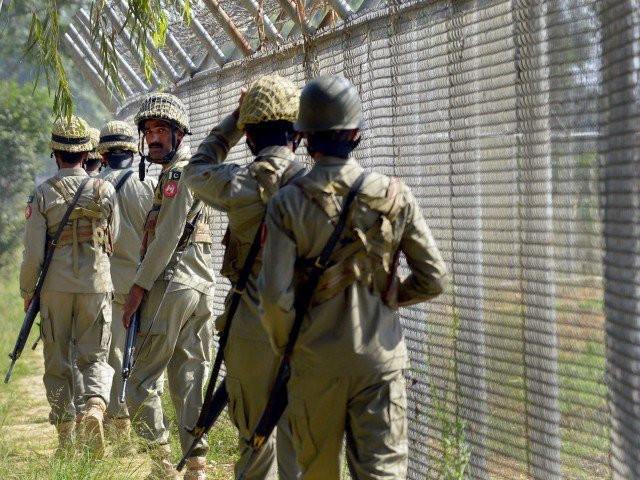A growing anxiety
The situation along the Line of Control and the Working Boundary with India is degrading almost by the hour

PHOTO: AFP
It is no exaggeration to say that the current level of hostilities is the most dangerous escalation since the 2003 ceasefire agreement between India and Pakistan. Since 2003 there have been innumerable violations of the ceasefire, many of them relatively minor in purely military terms but in recent weeks both the frequency and severity of the violations have racked up. The numbers of dead on both sides, civil and military, is rising and perhaps the most concerning aspect is that there is no operant handbrake. There is no agency or process or set of protocols that appear able or indeed willing to stop or at least bring a pause to what is now dangerously close to outright warfare.

The mantra is always ‘ …but neither side wants nor can afford a war’. Any war would be disastrous for both sides and not only at the combatant level but in terms of their international relations — and here we encounter the silence of the international community. It is possible that India is seeking to provoke Pakistan into an overreaction, a misstep militarily and there does not appear to be any voice outside the two adversaries that is audible or of sufficient heft to bring matters to a halt or at least an agreement to press the ‘pause’ button.
The international community, or at least those parts of it that might have an interest in the Indo-Pak disputes, is paralysed in the oncoming headlights of the impending Trump Presidency. Whatever the brutalities being perpetrated in Indian-held Kashmir they are rendered invisible or at the least irrelevant in a world preoccupied with what may in the end amount to a reshaping of the global political order. No state is about to launch a diplomatic lifeboat in the direction of India and Pakistan. Both are more exposed than they have been in decades and both are heavily reliant on the competences or otherwise of their statesmen, politicians and bureaucrats.
Now is the time when our diplomatic muscle requires flexing because matters cannot be allowed to drift any longer. The meeting between the Prime Minister and concerned parties on Thursday 24th was little more than due process, and took nothing forwards. It is not enough to maintain the status quo because events are moving faster than is the political ability to react.
Now is the time for the civil and military leadership to be both ringing the alarm bells as well as working the backchannels internationally in those capitals that need their focus shifting in this direction. India needs to have demonstrated for it in the clearest possible terms that enough is enough — and Pakistan needs to attend to its Foreign Ministry, and specifically the prolonged and corrosive absence of a formally appointed Foreign Minister that has the muscle and competencies as well as the profile to make them heard and understood on the world stage.
The current crisis demands some urgent out-of-the-box thinking which may not be comfortable politically — but the crisis is owned by all of us and not just those in elected seats of power. There is the expectation that the military will deliver as it always has but this needs more than artillery — it requires statesmanship if it is to be fixed and a political pragmatism that rarely makes it out of the box.
Published in The Express Tribune, November 25th, 2016.
Like Opinion & Editorial on Facebook, follow @ETOpEd on Twitter to receive all updates on all our daily pieces.















COMMENTS
Comments are moderated and generally will be posted if they are on-topic and not abusive.
For more information, please see our Comments FAQ